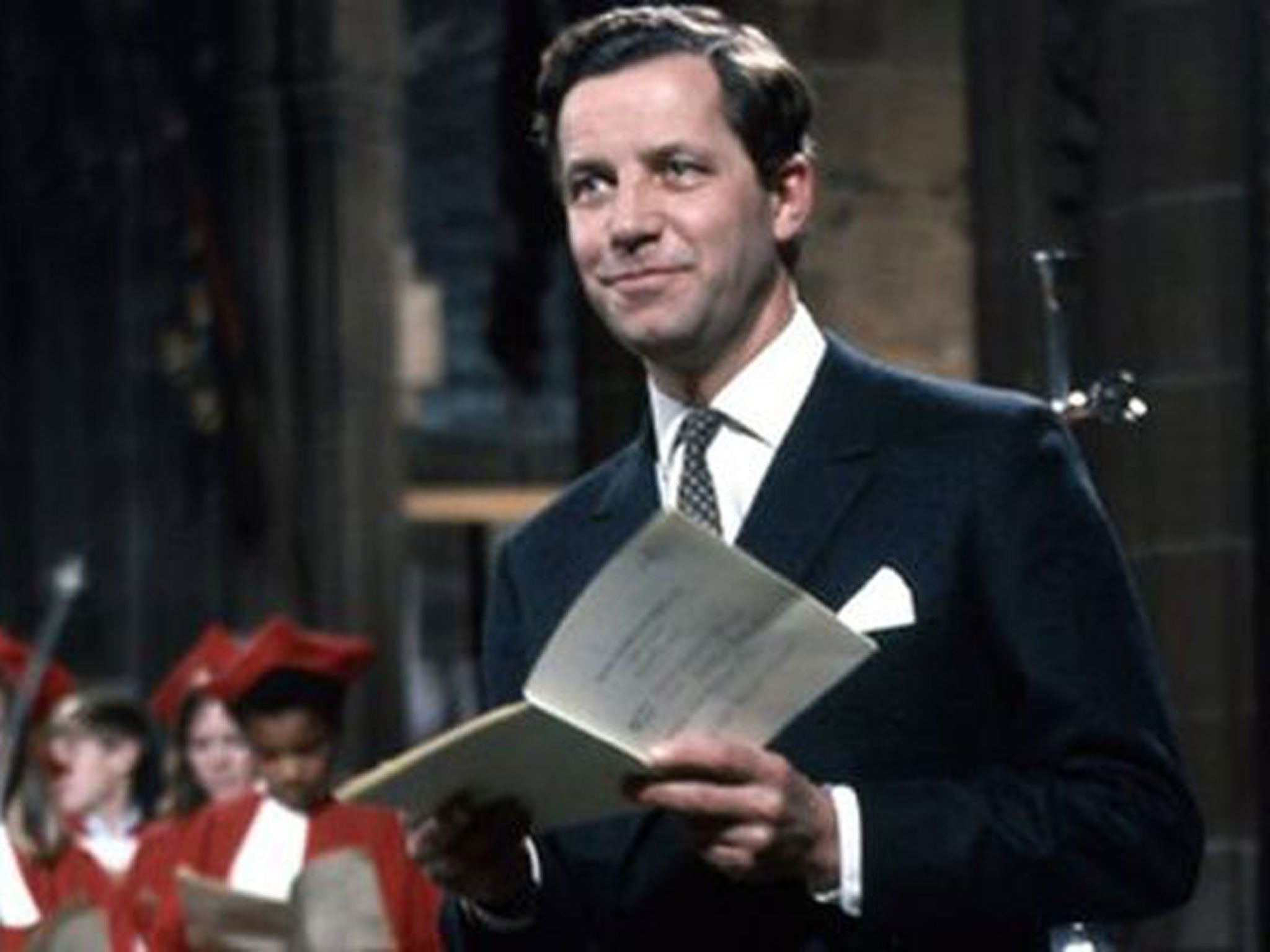Geoffrey Wheeler: The face of 'Songs of Praise' and 'Top of the Form' and deviser of the gambling game show 'Winner Takes All'

The urbane, relaxed voice of Geoffrey Wheeler gilded every form of broadcast, from television game show to radio drama, for 40 busy years, and his style as a quizmaster belonged very much to a more polite and gentle age of entertainment, compared with today's increasingly tense inquisitors.
Wheeler came from an era in which a television host was forbidden to walk away from a contestant who had been eliminated, instead waiting for him or her to be led away before he crossed to the victor. He personified the welcoming spirit of "it's not the winning, it's the taking part". Indeed, Yorkshire Television's Winner Takes All (1976-88) was a show that the diplomatic Wheeler devised specifically as a multiple-choice game, so that players never had to awkwardly confess on air that they didn't know an answer.
While his occasional excursions into acting never amounted to much, his prepossessing manner made him the ideal host for the BBC's Songs of Praise for two decades, crowning a diverse presenting career that included coverage of boat races, royal visits and general elections, and an impressive range of radio documentaries, often with a nostalgic, showbusiness theme.
Born in Manchester in 1930, he and his younger brother Peter, whose voice also made him his fortune, acted as children despite constant relocation due to their father's restless career as a hotel manager. Geoffrey Wheeler returned to his home city to read law, juggling his studies with numerous radio drama performances, and after graduating he joined what was then the BBC's North Region in 1954, as a trainee producer.
It was the golden autumn of the variety age, and Wheeler produced shows for a colourful array of acts including rising stars Morecambe and Wise. His television career developed alongside his radio work, beginning with his providing regional links on shows such as Come Dancing. In 1960 he got his own early evening programme, Lookout, an experimental outside broadcast exercise in which Wheeler and a crew, using what was known as the "roving eye" camera, went out and about talking to the public and capturing events. The series used new advances in technology that allowed for quick editing, to present reports in the form of visual diaries, and was a forerunner to the Seventies' magazine show Nationwide.
By 1962 Wheeler had risen to senior programme producer for the region, at which point he nipped back into acting briefly with a series of radio plays entitled "The Santa Problem", and then went freelance to co-host the television version of the schools quiz Top of the Form alongside David Dimbleby. He inherited the job after the maternal Judith Chalmers was the victim of a particularly distasteful veto, on the grounds that women did not have the authority to host game shows, even junior ones. The show pitted against each other two teams of mixed ages from different schools, and even had an international version, Transworld Top Team. This featured as scorer Bob Holness, who, a decade later, employed the same easy-going style as Wheeler when hosting the junior quiz Blockbusters.
Wheeler was a huge success, in time becoming sole host of Television Top of the Form and staying with the show, which had a prejudice towards high-achieving schools, throughout its 13 years. He returned to front a one-off revival on BBC4 in 2006. He was a particularly fine children's presenter, also fronting Yorkshire Television's excellent educational drama series How We Used to Live (1969) and taking a turn in the Jackanory storyteller's chair in 1970.
Straight after Top of the Form finished he went back in Manchester to star in the first radio play to come from the city's new Broadcasting House, Five Days in Fifty, by Alan Plater. At the same time he was devising his biggest success, Winner Takes All. In this gambling-themed general knowledge show, Wheeler asked impressively tricky questions, the possible answers to which were then backed by contestants placing bets. It was hosted at first by Jimmy Tarbuck, whose "difference of opinion here, Geoffrey" was the show's catchphrase, but for its last two years Wheeler took over his duties. In 1981, the programme awarded the biggest cash prize ever on a British game show, £6,620, a record it held for a further 12 years.
In the Nineties, Wheeler returned to radio, firstly to present On This Day, a regular look back at historical events through vintage news coverage and contemporary reminiscences from the public. He went on to front some magical documentaries, including The Palace of Laughter (2002), tracing the history of vaudeville, and The Actor, The Lodgings, The Kipper and Me (2004), collecting tales of actors in touring companies and the boarding-house lodgings they survived.
His brother Peter, who died in 2010, had an almost mirror-image career as a host and voice-over artist, and was best known as the voice of the court reporter in Granada's Crown Court throughout its 12-year run. Between them, the brothers continually graced the airwaves with sincerity and warmth, and above all, their immaculate presentation.
SIMON FARQUHAR
Geoffrey Wheeler, presenter, producer, voice-over artist and actor: born Manchester 1930; married (wife deceased, one son, one daughter); died Prestbury, Cheshire 30 December 2013.
Subscribe to Independent Premium to bookmark this article
Want to bookmark your favourite articles and stories to read or reference later? Start your Independent Premium subscription today.

Join our commenting forum
Join thought-provoking conversations, follow other Independent readers and see their replies